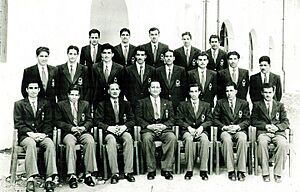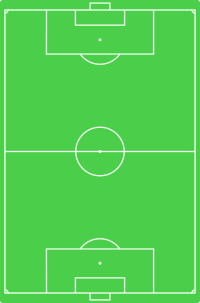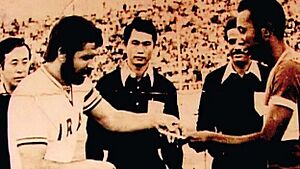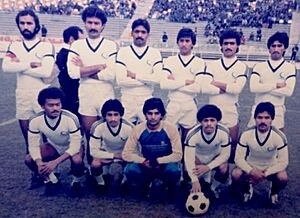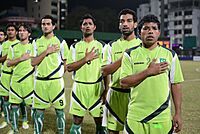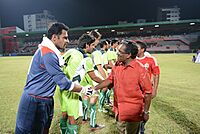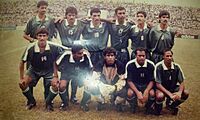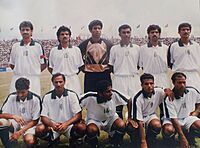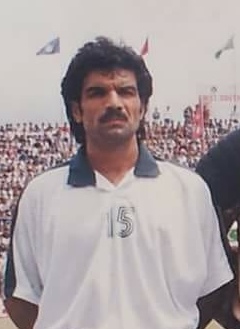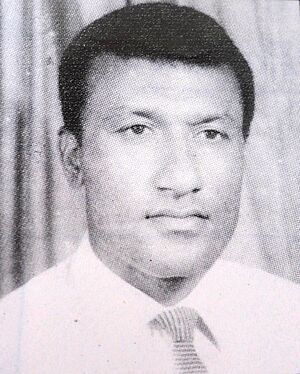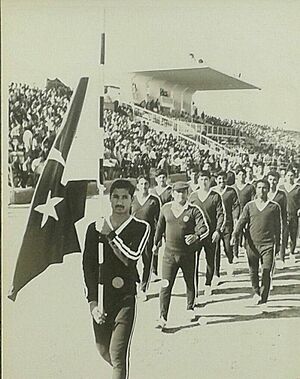Pakistan national football team facts for kids
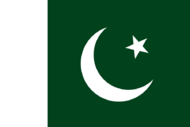 |
|||||||||||||||||||||||
| Nickname(s) | Shaheens (شاہین) (The Falcons) |
||||||||||||||||||||||
|---|---|---|---|---|---|---|---|---|---|---|---|---|---|---|---|---|---|---|---|---|---|---|---|
| Association | Pakistan Football Federation (PFF) | ||||||||||||||||||||||
| Confederation | AFC (Asia) | ||||||||||||||||||||||
| Sub-confederation | SAFF (South Asia) | ||||||||||||||||||||||
| Head coach | Nolberto Solano | ||||||||||||||||||||||
| Captain | Abdullah Iqbal | ||||||||||||||||||||||
| Most caps | Haroon Yousaf (49) | ||||||||||||||||||||||
| Top scorer | Muhammad Umer (14) | ||||||||||||||||||||||
| Home stadium | Jinnah Stadium | ||||||||||||||||||||||
| FIFA code | PAK | ||||||||||||||||||||||
|
|||||||||||||||||||||||
| FIFA ranking | |||||||||||||||||||||||
| Current | 199 |
||||||||||||||||||||||
| Highest | 141 (February 1994) | ||||||||||||||||||||||
| Lowest | 205 (June 2019) | ||||||||||||||||||||||
| Elo ranking | |||||||||||||||||||||||
| Current | 199 |
||||||||||||||||||||||
| Highest | 96 (9 December 1959) | ||||||||||||||||||||||
| Lowest | 208 (2012) | ||||||||||||||||||||||
| First international | |||||||||||||||||||||||
(Tehran, Iran; 27 October 1950) |
|||||||||||||||||||||||
| Biggest win | |||||||||||||||||||||||
(Kuala Lumpur, Malaysia; 5 August 1960) (Taipei, Taiwan; 6 April 2008) (Dhaka, Bangladesh; 8 December 2009) |
|||||||||||||||||||||||
| Biggest defeat | |||||||||||||||||||||||
(Tehran, Iran; 12 March 1969) (Amman, Jordan; 28 May 1993) |
|||||||||||||||||||||||
| AFC Challenge Cup | |||||||||||||||||||||||
| Appearances | 1 (first in 2006) | ||||||||||||||||||||||
| Best result | Group stage (2006) | ||||||||||||||||||||||
| Asian Games | |||||||||||||||||||||||
| Appearances | 5 (first in 1954) | ||||||||||||||||||||||
| Best result | Sixth place (1954) | ||||||||||||||||||||||
|
Medal record
|
|||||||||||||||||||||||
The Pakistan national football team (Urdu: پاکستان قومی فٹ بال ٹیم) plays for Pakistan in international men's football games. It is managed by the Pakistan Football Federation, which is the main group for football in Pakistan. Pakistan joined FIFA in 1948 and the Asian Football Confederation in 1954.
Pakistan's national team played its first game in 1950. They have not yet made it to the FIFA World Cup finals. The team has also not qualified for any big tournaments outside of South Asia. However, they won the 1952 Asian Quadrangular Football Tournament and earned gold medals at the South Asian Games in 1989 and 1991. The team was quite good in the 1950s and early 1960s. But as football became more popular worldwide, the sport in Pakistan faced challenges. This was mainly because football was not well-organized and did not get enough attention. Also, cricket is much more popular in South Asia, which made it harder for football to grow.
Contents
Team History
Early Football Years (1950s)
Soon after Pakistan was created in 1947, the Pakistan Football Federation (PFF) was formed. Muhammad Ali Jinnah became its first leader. FIFA officially recognized the PFF in early 1948.
Pakistan played its first official international game against Iran in Tehran on October 27, 1950. They lost 5–1. It is said that the Pakistani team played this match barefoot, which was common in South Asia back then. Pakistan also played friendly games during this trip. They beat Tehran's Taj 6–1 and tied 2–2 with a team from Isfahan. The next month, the team visited Iraq. Because the Iraqi FA could not put together a full national team, Pakistan played a friendly game against the club Haris al-Maliki, which ended in a 1–1 draw.
Pakistan's next international event was the 1952 Asian Quadrangular Football Tournament. They finished as joint winners with India because they had the same points. Pakistan won a coin toss and got to keep the shared trophy for the first six months. In the same year, Pakistan played Iran again at home, and the game ended in a 0–0 tie.
In the early 1950s, Pakistan played in more Asian Quadrangular Football Tournaments. These were held in Burma in 1953, India in 1954, and East Pakistan in 1955. The team first played in the 1954 Asian Games in Manila, Philippines. In a group match, Masood Fakhri scored three goals, which is called a hat-trick. He was the first player from Pakistan to do this as Pakistan beat Singapore 6–2.

The Pakistan Football Federation was one of the 13 groups that started the Asian Football Confederation on May 8, 1954. Pakistan was supposed to play against Israel in the first 1956 AFC Asian Cup qualifiers. However, they pulled out, along with Afghanistan, because they did not want to host the Israeli team. In 1956, the team visited Ceylon, Singapore, and China. Two years later, they played in the 1958 Asian Games in Japan. In 1959, after a trip to Burma, Pakistan decided to join the 1960 Asian Cup qualifiers in India. There, Pakistan played Iran, India, and Israel twice. Israel qualified by finishing first. Pakistan had a great win over Iran (4–1), beat India (1–0), and tied with Israel. They finished third in the group, ahead of India but behind Iran.
Growing Stronger (1960s)
Pakistan played in several friendly tournaments in the early 1960s. They first joined the Merdeka Cup in Malaysia in 1960. Pakistan won 7–0 against Thailand and 3–1 against Japan. Two years later, in the 1962 Merdeka Tournament, Pakistan finished second after losing to Singapore 1–2 in the final.
In 1963, the China national team visited Pakistan. The first game in Dhaka (now Bangladesh) was a 0–0 tie. Pakistan won the second match in Peshawar 3–2. The third game in Lahore was another 1–1 draw. The last match in Karachi ended in a 2–0 loss for Pakistan. In the 1964 Summer Olympics qualification, Pakistan lost 4–1 in Iran but won 1–0 at home. Pakistan visited China in 1964 and played several games against local teams, including a 2–0 win against the China national team.
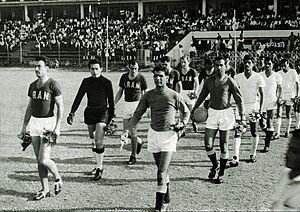
In 1965, after a trip to Ceylon, Pakistan played in the first 1965 RCD Cup and finished third. In the 1960s, the national team also hosted teams from the Soviet Union, Saudi Arabia, and the Dallas Tornados for friendly games. In 1967, Pakistan lost their Asian Cup qualifiers against Burma and Cambodia. They tied their last match against India. They then hosted the second 1967 RCD Cup and finished third. In 1969, they went to Iran for the 1969 Friendship Cup. They won 2–1 against Iraq but lost 9–1 to Iran, which was a record defeat. They also had disappointing results in the 1969 and 1970 RCD Cup tournaments.
Even though football grew in the 1960s, Pakistan did not often play in the Asian Games football tournaments. This was due to money problems and a lack of support from the football federation and government.
Difficult Times (1970s)
After the 1971 Bangladesh Liberation War, East Pakistan became the country of Bangladesh. This separation meant Pakistan lost the Dhaka First Division League. This league had offered a higher level of competition and professionalism than what was usually found in West Pakistan. It often attracted top players from West Pakistan and was a very important league.
The national team did not play again until 1973. That year, the team toured the Far East, playing several friendly games against local teams. They also played a friendly against China, losing 4–7.
In the early 1970s, the national team played in the 1974 RCD Cup and the 1974 Asian Games. A notable result was a 2–2 draw against Turkey in the RCD Cup and a 5–1 win against Bahrain in the Asian Games. Two years later, Pakistan hosted the first 1976 Quaid-e-Azam International Tournament in Karachi.
Coming Back Stronger (1980–1990)
After not playing much competitive football for several years, Pakistan played in the 1981 King's Cup. They had a 0–0 draw against Semarang from Indonesia. After losing to Thailand, they won 3–2 against Malaysia. They lost a close game against August 1 from China but won their final game 1–0 against Singapore.
Pakistan hosted the 1982 Quaid-e-Azam International Tournament. Teams like Iran, Bangladesh, Oman, Nepal, and the second Pakistan team (Pakistan Blues) joined. The Green Shirts started with a 2–0 win over Nepal. They then lost to Iran but came back to beat Bangladesh 2–1. The last game against Oman was a 0–0 tie. Pakistan finished third, behind the Pakistan Blues team. In 1984, the national team played in the 1984 Merdeka Tournament and later in the 1984 AFC Asian Cup qualification. They lost 4 out of 5 games, with their only win being 4–1 against North Yemen.
The national team hosted another 1985 Quaid-e-Azam International Tournament. This time, North Korea XI, Indonesia Youth, Bangladesh, and Nepal were invited. A 0–0 draw against the North Koreans gave the team a boost. They beat Nepal by one goal. However, they lost their last two games against Bangladesh and Indonesia. In the 1985 South Asian Games, Pakistan finished fourth after losing a penalty shootout to Nepal in the third-place match.
After playing in the 1986 Fajr International Tournament in Iran, the team finished second in the 1986 Quaid-e-Azam International Tournament. This tournament included China, Sri Lanka, Nepal, and a South Korean XI. In the 1986 Asian Games, Pakistan lost all their games.
In 1987, Pakistan had a tough time in the 1988 Summer Olympics Qualification against Nepal. However, they did better at the 1987 South Asian Games, winning the bronze medal match against Bangladesh 1–0. In 1988, after losing the 1988 AFC Asian Cup qualification, Pakistan started their first ever 1990 FIFA World Cup qualifiers for Italy. They lost all their matches. The national team then bounced back and won gold at the 1989 South Asian Games. They beat Bangladesh 1–0 in the final, with a goal by Haji Abdul Sattar right at the end of the game.
Challenges and Suspensions (1990s–Present)
Pakistan had another early exit in the 1990 Asian Games, losing all three games. However, in the 1991 South Asian Games, Pakistan beat the Maldives 2–0 in the final to win their second gold medal. Goals were scored by Qazi Ashfaq and Muhammad Nauman Khan. In 1992, the team lost all matches at the 1992 AFC Asian Cup qualification and the 1992 Jordan International Tournament. After failing to qualify for the 1994 FIFA World Cup in 1993, the team hosted the first 1993 SAARC Gold Cup in Lahore, finishing fourth. At the 1993 South Asian Games, they could not get past the group stage.
Pakistan was eliminated from the 1995 SAARC Gold Cup group stage due to goal difference. The team lost all their Asian Cup and World Cup qualifying games. Pakistan finished third in the 1997 SAFF Cup, winning 1–0 against Sri Lanka in the third-place playoff. In the 1999 SAFF Cup, Pakistan finished last in their group. They also failed to get out of the group stage in the final 1999 South Asian Games that included full international teams.

Pakistan could not win any of their 2000 Asian Cup qualifiers. The next year, Pakistan earned their first point in the 2002 World Cup qualification. This was thanks to Gohar Zaman scoring three goals in a 3–3 draw against Sri Lanka. However, all other matches ended in defeat.
In 2002, Pakistan played an unsuccessful four-match series against Sri Lanka. At the 2003 SAFF Cup, with the help of attacking midfielder Sarfraz Rasool, Pakistan surprised India, Sri Lanka, and Afghanistan with three wins. They reached the semi-finals but lost 1–0 to Maldives. Pakistan finished fourth, losing 2–1 in extra time to India in the third-place playoff. Later that year, Pakistan won their first Asian Cup qualifier 3–0 against Macao, but still did not qualify. They ended the year with losses to Kyrgyzstan in the World Cup qualifiers.
The year 2004 brought changes to Pakistan football. A new leadership was in place, and a new national league started. Pakistan had a win and a draw against India in a three-match series, with the final match ending 3–0 in favor of the Green Shirts. They then reached the semi-finals of the 2005 SAFF Cup, losing 0–1 to defending champion Bangladesh.
The Pakistan team lost their first two Asian Cup qualifiers in 2006. In between, they played in the first 2006 AFC Challenge Cup. They did not get past the group stage but beat Kyrgyzstan 1–0. Back in the Asian Cup qualifiers, they lost their remaining games. In the 2010 World Cup qualifiers in 2007, they suffered a big defeat by the Asian champions Iraq, losing 7–0 over two games after a 0–0 draw in the second match. In 2008, Pakistan traveled to Nepal for two friendly games before the 2008 AFC Challenge Cup qualification. They won against Chinese Taipei 2–1 and beat Guam in a record-tying 9–2 win in the final match. However, other results, including a 7–1 loss to Sri Lanka, meant they again failed to reach the finals.
In the 2008 SAFF Championship, Pakistan did not get past the group stages. They lost to Maldives 3–0, India 2–1, and Nepal 4–1. This led to Akhtar Mohiuddin leaving his role as head coach. After Mohiuddin left, George Kottan was hired and led the team to the 2009 SAFF Championship. The team lost 1–0 to Sri Lanka and then drew 0–0 with Bangladesh, where Adnan Ahmed missed a late penalty. Pakistan won their last game against Bhutan 7–0.
Kottan was let go in February 2010. Pakistan did not play any senior games for the rest of that year. For the 2012 AFC Challenge Cup qualification in 2011, coach Tariq Lutfi was brought back but the team did not succeed. Losses like 3–0 against Turkmenistan and 3–1 against India meant the team was out of the qualifiers, even though they beat Chinese Taipei 2–0. Later, in the 2014 FIFA World Cup Qualifiers in July, Pakistan lost 3–0 to Bangladesh in Dhaka. A few days later, they had a 0–0 draw in Lahore. Pakistan did not qualify for the 2014 FIFA World Cup, being knocked out by Bangladesh in the first round of the AFC qualifying section in 2011, losing 3–0 overall.
That marked the end of Lutfi's time as coach. Serbian coach Zaviša Milosavljević took over in November 2011, just before the 2011 SAFF Championship. Even with little time to prepare the team, Zavisa managed to draw 0–0 with Bangladesh, 0–0 with Maldives, and 1–1 with Nepal in the 2011 SAFF Championship held in India. However, they could not move on to the semi-finals.
The only game in 2012 was in November against Singapore, who beat Pakistan 4–0 at home. Pakistan started 2013 well, winning two games against Nepal by 1–0 each. A 1–1 draw with Maldives followed, but with many games close together, Pakistan lost the last game 3–0 in Male.
Pakistan then played in the 2014 AFC Challenge Cup qualification in Bishkek. They lost 1–0 to Tajikistan in injury time. Pakistan also lost 1–0 against Kyrgyzstan after scoring in the first minute, but they comfortably beat Macau 2–0.
Pakistan played a friendly against Afghanistan in August, losing 3–0 without their players who play abroad. Coach Zaviša Milosavljević was controversially removed and replaced by Bahrain's Mohammad Al-Shamlan. Al-Shamlan worked as a coaching advisor to Shahzad Anwar in the 2013 SAFF Championship. The Shaheens lost their first game 1–0 to India because of an own-goal by Samar Ishaq. Against hosts Nepal, Hassan Bashir scored an early goal, but 15-year-old Bimal Gharti Magar tied the game in injury time. However, Pakistan beat Bangladesh 2–1 but did not make it to the semi-finals. The team played in the 2013 Philippine Peace Cup at the end of the year.
For Pakistan's journey to the 2018 FIFA World Cup, they faced Yemen in Round 1 of the AFC qualifying section. In the first match, Pakistan lost 3–1. In the second match, Pakistan drew 0–0, which meant they were out of the tournament based on the total score.
Pauses in Play and FIFA Suspensions (2015–2022)
FIFA stopped Pakistan from playing all football activities on October 10, 2017. This happened after problems with the PFF president, Makhdoom Syed Faisal Saleh Hayat. He was described as someone who had too much control over Pakistani football.
For three years, starting in March 2015, the top football league in Pakistan, the Pakistan Premier League, was stopped because of these issues. The men's senior team also could not play in any international games. The team's FIFA ranking dropped from 168 in 2003 to its lowest at 201 in 2017.
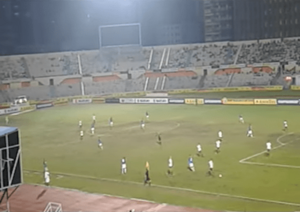
FIFA brought Pakistan back into its membership on March 13, 2018.
Pakistan went to Bangladesh to play in the 2018 SAFF Cup, which started in September 2018. This was their first FIFA-recognized tournament in three years. Pakistan won their first match against Nepal 2–1. Pakistan lost their next match to hosts Bangladesh 1–0 after giving up a late goal. The Green Shirts played their final group game against Bhutan, winning 3–0. This win secured their spot in the semi-finals after 13 years. Pakistan faced their rivals India in the semi-final and were knocked out, losing 3–1.
After the SAFF Cup, Pakistan talked with the Palestine Football Association about a friendly game. It was first reported that the match would be played in Lahore, Pakistan, on November 15, 2018. But Palestine decided to host the game instead. Due to visa problems, the Pakistan team could not fly to Palestine on the planned date. So, the match was played on November 16, where the Shaheens lost 2–1.
Disappointment struck again as Pakistan lost their chance to qualify for the 2022 FIFA qualification. They lost to Cambodia twice in the first round and were eliminated. The training camp for these matches was organized by two different football groups, which caused problems. The Faisal Saleh Hayat-led Pakistan Football Federation was recognized by FIFA, but the Ashfaq Hussain Shah group was not. This second group took control through elections that were influenced by outside parties, as decided by the Supreme Court.
Pakistan was again stopped from all football activities by FIFA on April 7, 2021. This suspension was lifted on June 29, 2022.
Return to International Football (2022–2024)
Pakistan returned to playing international football with a friendly match against Nepal in November 2022, losing 0–1 due to a late goal. They played a second friendly match against Maldives in March 2023, also losing 0–1.
Pakistan then took part in the 2023 Mauritius Four Nations Cup with Mauritius, Kenya, and Djibouti. They also played in the 2023 SAFF Championship against India, Kuwait, and Nepal in the group stages. They lost all six matches and finished last in their group in both competitions.
On July 27, 2023, the draw for the first round of the 2026 FIFA World Cup qualification took place. Pakistan was drawn again against Cambodia. Soon after, English coach Stephen Constantine was appointed. In the first game in Phnom Penh, Pakistan had a 0–0 draw. Pakistan won their second game, beating Cambodia 1–0 in Islamabad. This was thanks to a goal by Harun Hamid. It was their first win ever in World Cup qualifiers and their first home game in eight years, allowing them to move to the second round for the first time.
After this win in Islamabad, the Shaheens were placed in a group with Saudi Arabia, Jordan, and Tajikistan. Pakistan, ranked 193rd, was the lowest-ranked team in the qualifiers. They finished the campaign losing all their games in the group.
FIFA Suspension in 2025
Pakistan was suspended from all football activities by FIFA on February 6, 2025. This happened because they did not adopt a new version of the PFF constitution that FIFA and the AFC had approved. This new constitution would have made sure elections were fair. The suspension was lifted on March 2, 2025, after the PFF agreed to use the FIFA and AFC-approved constitution.
Team Look
Kit and Colors
The Pakistan national team's home uniform has always been a green shirt and white shorts. These colors come from the flag of Pakistan. The flag is green with a white crescent moon and five-pointed star in the middle, and a white stripe on the left side. The away shirt color has changed over time. The team has used a white shirt with white shorts or a white shirt with green shorts. Historically, a white shirt with green shorts is the most common combination.
Kit Suppliers
Home Stadiums
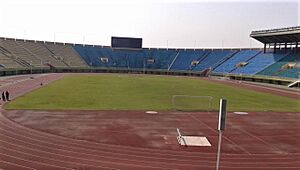
For the first fifty years, Pakistan played their home games at different multi-purpose stadiums across the country, especially in Karachi. The Hockey Club stadium hosted the 1974 RCD Cup and the first 1976 Quaid-e-Azam International Tournament. The next 1982 Quaid-e-Azam International Tournament was held at the cricket National Stadium. The 1985 tournament was at the Qayyum Stadium in Peshawar.
The Pakistan Football Federation does not own any stadium. However, since the 1980s, Pakistan plays most of its home matches at the Jinnah Sports Stadium in the capital city of Islamabad. This stadium first hosted the 1986 Quaid-e-Azam International Tournament, and the senior team won the 1989 South Asian Games there. By the 1990s, the Railway Stadium in Lahore also became a main venue. It hosted the first 1993 SAARC Gold Cup.
In the 2000s, other stadiums became available, such as Karachi's People's Football Stadium and the Punjab Stadium in Lahore, which is near the Pakistan Football Federation headquarters.
The Jinnah Sports Stadium is the biggest football stadium in Pakistan, holding over 45,000 people. The People's Football Stadium is the second largest, with a capacity of 40,000.
Pakistan B Team
Sometimes, two Pakistan national teams played in the Quaid-e-Azam International Tournament. The main team was called Pakistan Greens, and the second team was called Pakistan Reds in 1976, Pakistan Blue in 1982, and Pakistan White in 1985, 1986, and 1987. This second team usually had "second string" or younger international players. Having two separate teams was common in the 1980s and 1990s for developing South Asian countries like Nepal and Bangladesh. In 1977, a B team managed by Qayyum Changezi also played as Shaheen FC at the Afghanistan Republic Day Festival Cup. In May 1978, the team played in a Youth Tournament in Riyadh, Saudi Arabia, facing Saudi Arabia, South Korea, and Kenya.
In June 1993, the Pakistan Football Federation sent a different team, called "Pakistan A", to the 1993 ECO Cup in Tehran, Iran. At the same time, the main national team was playing in the 1994 FIFA World Cup qualifiers. The ECO Cup team had different coaches, Muhammad Latif and Abdul Ghafoor Ajiz, and was led by captain Lal Muhammad Lalo. The main national team was led by Muhammad Aslam Japani. Some players from the ECO Cup team, like Adeel Sarfraz Butt and Iftikhar Ghani, were later chosen for the second part of the World Cup qualifiers. At the first 1993 SAARC Gold Cup in Lahore, a second team called Pakistan White also played friendly games against the national teams in the tournament.
Team Rivalries
India
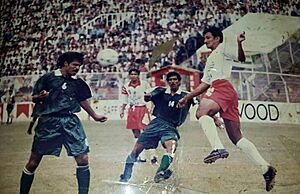
Pakistan's main rivals in many sports, including football, are India. The two teams first played each other at the 1952 Asian Quadrangular Football Tournament. That game was a 0–0 draw, and both teams were named champions. India first won against Pakistan in the next tournament, the 1953 Asian Quadrangular Football Tournament, with a 1–0 win. Pakistan's men's football team got its first official win over India in the 1960 AFC Asian Cup qualification, with Abdullah Rahi scoring the winning goal. So far, Pakistan has won three games, there have been eight draws, and India has won sixteen games out of 27 matches. Also, the two teams played two friendly games after the 1953 and 1955 Asian Quadrangular Football Tournament editions, and Pakistan won both times by 1–0.
Afghanistan
Pakistan also has a rivalry with Afghanistan in many sports, including football. The national teams of Pakistan and Afghanistan used to play sports events regularly. However, their diplomatic ties were cut after the Soviet invasion of Afghanistan in 1979. The wars and instability in Afghanistan stopped the two sides from playing again until 2003. Because of the history, culture, and politics between the two countries, games against Pakistan create a lot of excitement among Afghan football fans. This is called a "rivalry". However, in Pakistan, there is less interest in this rivalry and in football generally.
Recent Games
The following is a list of match results from the last 12 months, and any future matches that have been planned.
Win Draw Loss Fixture
2025 Matches
| 25 March 2025 2027 AFC Asian Cup qualification | Syria |
2–0 | Al Hofuf, Saudi Arabia | |
| 21:00 UTC+3 |
|
Stadium: Prince Abdullah bin Jalawi Stadium Attendance: 1,217 Referee: Sivakorn Pu-Udom (Thailand) |
| 10 June 2027 AFC Asian Cup qualification | Myanmar |
1–0 | Yangon, Myanmar | |
| 17:00 UTC+6:30 | Stadium: Thuwunna Stadium Attendance: 22,000 Referee: Zhang Lei (China) |
| 9 October 2025 2027 AFC Asian Cup qualification | Pakistan |
v | Islamabad, Pakistan | |
| --:-- | Stadium: Jinnah Sports Stadium |
| 14 October 2025 2027 AFC Asian Cup qualification | Afghanistan |
v | Afghanistan | |
| --:-- |
| 18 November 2025 2027 AFC Asian Cup qualification | Pakistan |
v | Islamabad, Pakistan | |
| Stadium: Jinnah Sports Stadium |
2026 Matches
| 31 March 2026 2027 AFC Asian Cup qualification | Myanmar |
v | Islamabad, Pakistan | |
| --:-- | Stadium: Jinnah Sports Stadium |
Coaching Staff
Team Personnel
| Position | Name |
|---|---|
| Head coach | |
| Assistant coach | |
| Goalkeeper coach | N/A |
| Fitness coach | N/A |
| Conditioning coach | N/A |
Players
Current Team Members
The players listed below were chosen for the 2027 AFC Asian Cup qualification game against Myanmar on June 10, 2025.
Caps (games played) and goals are correct as of June 10, 2025, after the match against Myanmar.
| No. | Pos. | Player | Date of birth (age) | Caps | Goals | Club |
|---|---|---|---|---|---|---|
| 1 | GK | Yousuf Butt | 18 October 1989 | 31 | 0 | |
| 20 | GK | Hassan Ali | 23 February 2003 | 0 | 0 | |
| 22 | GK | Saqib Hanif | 23 April 1994 | 8 | 0 | |
|
|
||||||
| 2 | DF | Mohammad Umar Hayat | 22 October 1996 | 21 | 1 | |
| 3 | DF | Mohammad Fazal | 29 May 2002 | 4 | 0 | |
| 4 | DF | Abdullah Iqbal (Captain) | 27 July 2002 | 16 | 0 | |
| 5 | DF | Haseeb Khan | 4 April 2000 | 6 | 0 | |
| 6 | DF | Mamoon Moosa Khan | 28 November 2000 | 10 | 0 | |
| 7 | DF | Waqar Baloch | 2 March 1996 | 4 | 0 | |
| 15 | DF | Mohib Ullah | 23 May 2005 | 2 | 0 | |
| 18 | DF | Abdul Rehman | 25 February 2008 | 2 | 0 | |
|
|
||||||
| 8 | MF | Rahis Nabi | 16 April 1999 | 18 | 1 | Free agent |
| 11 | MF | Harun Hamid | 10 November 2003 | 15 | 1 | |
| 12 | MF | Umair Ali | 17 May 1999 | 3 | 0 | |
| 16 | MF | Ali Uzair | 14 October 1996 | 19 | 0 | |
| 19 | MF | Moin Ahmed | 28 November 2003 | 5 | 0 | |
| 21 | MF | Alamgir Ghazi | 9 May 1998 | 15 | 0 | |
|
|
||||||
| 9 | FW | Fareed Ullah | 1 January 2001 | 10 | 0 | |
| 10 | FW | McKeal Abdullah | 7 July 2005 | 4 | 0 | |
| 13 | FW | Adeel Younas | 23 March 2006 | 4 | 0 | |
| 14 | FW | Ali Haider Shah | 2 March 2003 | 1 | 0 | |
| 17 | FW | Shayak Dost | 1 May 2002 | 15 | 0 | |
| 23 | FW | Abdul Arshad | 26 February 2003 | 10 | 0 | |
Recently Called-Up Players
The following players have also been called to the Pakistan team in the last year.
| Pos. | Player | Date of birth (age) | Caps | Goals | Club | Latest call-up |
|---|---|---|---|---|---|---|
| GK | Adam Khan | 24 October 2005 | 0 | 0 | v. |
|
| GK | Abdul Basit Ghafoor | 1 July 1990 | 0 | 0 | v. |
|
|
|
||||||
| DF | Junaid Shah | 23 March 2003 | 4 | 0 | v. |
|
| DF | Easah Suliman | 26 January 1998 | 9 | 0 | v. |
|
|
|
||||||
| MF | Ali Zafar | 28 August 2007 | 0 | 0 | v. |
|
| MF | Toqeer Ul Hassan | 25 August 2001 | 0 | 0 | v. |
|
|
|
||||||
| FW | Imran Kayani | 24 December 2001 | 7 | 0 | v. |
|
|
||||||
Player Records
- Players in bold are still active with Pakistan.
Most Games Played
| Rank | Player | Caps | Goals | Period |
|---|---|---|---|---|
| 1 | Haroon Yousaf | 49 | 3 | 1992–2003 |
| 2 | Jaffar Khan | 46 | 0 | 2001–2013 |
| 3 | Samar Ishaq | 43 | 3 | 2006–2013 |
| 4 | Zafar Iqbal | 40 | 1 | 1985–1995 |
| 5 | Muhammad Essa | 39 | 11 | 2001–2009 |
| 6 | Tanveer Ahmed | 31 | 3 | 1999–2008 |
| Yousuf Butt | 31 | 0 | 2012–present | |
| 8 | Sharafat Ali | 30 | 12 | 1984–1992 |
| Mohammad Tariq Hussain | 30 | 0 | 1987–2003 | |
| 10 | Hassan Bashir | 29 | 9 | 2012–2023 |
- Note: The exact number of games played by players before 1989 and 1999 is not fully known yet. This means players like Zafar Iqbal and Mohammad Tariq Hussain likely played more games than currently recorded. Also, player appearances are missing for the 2000 AFC Asian Cup qualification, two friendly matches against Sri Lanka in 2002, and a friendly against Palestine in 2006. These will be updated when more information is found.
Top Goal Scorers
| Rank | Player | Goals | Caps | Ratio | Period |
|---|---|---|---|---|---|
| 1 | Muhammad Umer | 14 | 25 | 0.56 | 1956–1965 |
| 2 | Sharafat Ali | 12 | 30 | 0.4 | 1984–1992 |
| 3 | Muhammad Essa | 11 | 39 | 0.28 | 2001–2009 |
| 4 | Masood Fakhri | 10 | — | — | 1952–1955 |
| 5 | Hassan Bashir | 9 | 29 | 0.31 | 2012–2023 |
| 6 | Moosa Ghazi | 7 | — | — | 1955–1967 |
| Qayyum Changezi | 7 | — | — | 1955–1963 | |
| Arif Mehmood | 7 | 21 | 0.33 | 2005–2012 | |
| 9 | Ghulam Sarwar | 6 | 16 | 0.38 | 1984–1992 |
| Muhammad Nauman Khan | 6 | 14 | 0.43 | 1991–1997 | |
| Sarfraz Rasool | 6 | 23 | 0.26 | 1997–2003 |
Team Captains
- This list shows captains in major tournaments. For a full list, see the main article.
| Player | Tournament |
|---|---|
| Moideen Kutty |
|
| Nabi Chowdhury |
|
| Abdul Ghafoor |
|
| Muhammad Naveed |
|
| Mateen Akhtar |
|
| Jaffar Khan |
|
Tournament Records
FIFA World Cup
| FIFA World Cup record | Qualification record | |||||||||||||||
|---|---|---|---|---|---|---|---|---|---|---|---|---|---|---|---|---|
| Year | Result | Position | Pld | W | D* | L | GF | GA | Pld | W | D* | L | GF | GA | ||
| 1930 to 1938 | Part of |
Part of |
||||||||||||||
| 1950 to 1986 | Did not enter | Did not enter | ||||||||||||||
| Did not qualify | 4 | 0 | 0 | 4 | 1 | 12 | ||||||||||
| 8 | 0 | 0 | 8 | 2 | 36 | |||||||||||
| 4 | 0 | 0 | 4 | 3 | 22 | |||||||||||
| 6 | 0 | 1 | 5 | 5 | 29 | |||||||||||
| 2 | 0 | 0 | 2 | 0 | 6 | |||||||||||
| 2 | 0 | 1 | 1 | 0 | 7 | |||||||||||
| 2 | 0 | 1 | 1 | 0 | 3 | |||||||||||
| 2 | 0 | 1 | 1 | 1 | 3 | |||||||||||
| 2 | 0 | 0 | 2 | 1 | 4 | |||||||||||
| 8 | 1 | 1 | 6 | 2 | 26 | |||||||||||
| To be determined | To be determined | |||||||||||||||
| Total | — | 0/20 | — | — | — | — | — | — | 40 | 1 | 5 | 34 | 15 | 148 | ||
AFC Asian Cup
| AFC Asian Cup record | Qualification record | ||||||||||||||
|---|---|---|---|---|---|---|---|---|---|---|---|---|---|---|---|
| Year | Result | Position | Pld | W | D* | L | GF | GA | Pld | W | D* | L | GF | GA | |
| Withdrew | Withdrew | ||||||||||||||
| Did not qualify | 6 | 2 | 1 | 3 | 8 | 10 | |||||||||
| Withdrew | Withdrew | ||||||||||||||
| Did not qualify | 3 | 0 | 1 | 2 | 1 | 4 | |||||||||
| Withdrew | Withdrew | ||||||||||||||
| Did not qualify | 4 | 1 | 0 | 3 | 4 | 14 | |||||||||
| 4 | 0 | 0 | 4 | 1 | 12 | ||||||||||
| 2 | 0 | 0 | 2 | 0 | 9 | ||||||||||
| 2 | 0 | 0 | 2 | 0 | 7 | ||||||||||
| 4 | 0 | 0 | 4 | 0 | 16 | ||||||||||
| 2 | 1 | 0 | 1 | 3 | 3 | ||||||||||
| 8 | 0 | 1 | 7 | 4 | 23 | ||||||||||
| Did not enter | AFC Challenge Cup | ||||||||||||||
| Did not qualify | 2 | 0 | 1 | 1 | 1 | 3 | |||||||||
| 2 | 0 | 0 | 2 | 1 | 4 | ||||||||||
| To be determined | 9 | 1 | 1 | 7 | 2 | 28 | |||||||||
| Total | — | 0/18 | — | — | — | — | — | — | 39 | 4 | 4 | 31 | 23 | 105 | |
AFC Challenge Cup
The AFC Challenge Cup was held every two years from 2006 to 2014.
SAFF Championship
Asian Games
- Football at the Asian Games has been for players under 23 years old since 2002.
South Asian Games
- Football at the South Asian Games has been for players under 23 years old since 2004.
RCD Cup
Team Achievements
Regional Awards |
Friendly Awards
|
See also
 In Spanish: Selección de fútbol de Pakistán para niños
In Spanish: Selección de fútbol de Pakistán para niños
- Football in Pakistan
- Women's football in Pakistan
- Pakistan national under-23 football team
- Pakistan national under-20 football team
- Pakistan national under-17 football team
- Pakistan Football Federation
 | Selma Burke |
 | Pauline Powell Burns |
 | Frederick J. Brown |
 | Robert Blackburn |


